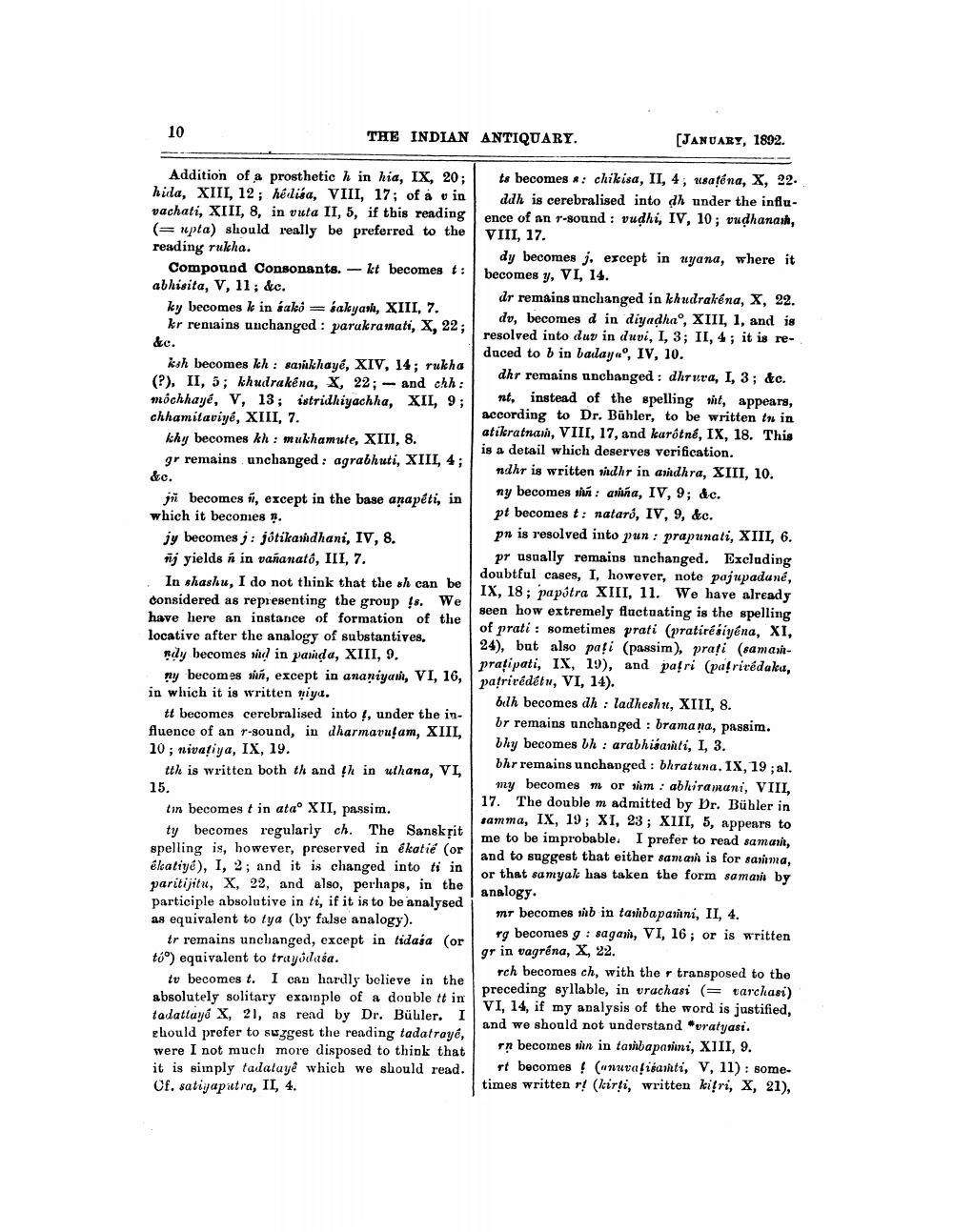________________
10
THE INDIAN ANTIQUARY.
Addition of a prosthetic h in hia, IX, 20; hida, XIII, 12; hédiéa, VIII, 17; of a vin vachati, XIII, 8, in vuta II, 5, if this reading (upta) should really be preferred to the reading rukha.
Compound Consonants.kt becomes t abhisita, V, 11; &c.
ky becomes k in sako = sakyash, XIII, 7. kr remains unchanged: parakramati, X, 22;
&c.
ksh becomes kh: samkhayé, XIV, 14; rukha (?), II, 5; khudrakéna, X, 22; - and chh: mochhayé, V, 13; istridhiyachha, XII, 9; chhamitaviyé, XIII, 7.
khy becomes kh: mukhamute, XIII, 8. gr remains unchanged: agrabhuti, XIII, 4;
&c.
jn becomes i, except in the base anapéti, in which it becomes .
jy becomes j: jôtikamdhani, IV, 8.
nj yields n in vañanatô, III, 7.
tt becomes cerebralised into !, under the influence of an r-sound, in dharmavuļam, XIII, 10; nivatiya, IX, 19.
tth is written both th and th in uthana, VI,
15.
tin becomes t in ata° XII, passim.
ty becomes regularly ch. The Sanskrit spelling is, however, preserved in ékatie (or élatiye), 1, 2; and it is changed into ti in paritijitu, X, 22, and also, perhaps, in the participle absolutive in ti, if it is to be analysed as equivalent to tya (by false analogy).
tr remains unchanged, except in tidaśa (or tó) equivalent to trayodasa.
[JANUARY, 1892.
ts becomes a chikisa, II, 4, usaténa, X, 22. ddh is cerebralised into dh under the influence of an r-sound: vudhi, IV, 10; vudhanash, VIII, 17.
tv becomes t. I can hardly believe in the absolutely solitary example of a double tt in tadattaye X, 21, as read by Dr. Bühler. I ehould prefer to suggest the reading tadatrayé, were I not much more disposed to think that it is simply tadalayê which we should read. Cf. satiyaputra, II, 4.
dy becomes j. except in uyana, where it becomes y, VI, 14.
In shashu, I do not think that the sh can be considered as representing the groups. We have here an instance of formation of the locative after the analogy of substantives.
ndy becomes and in panda, XIII, 9.
ny becomes in, except in ananiyam, VI, 16, patrirédétu, VI, 14). in which it is written niya.
dr remains unchanged in khudrakéna, X, 22. dv, becomes d in diyaḍha, XIII, 1, and is resolved into duv in duvi, I, 3; II, 4; it is reduced to b in badaya, IV, 10.
dhr remains unchanged: dhruva, I, 3; &c. nt, instead of the spelling it, appears, according to Dr. Bühler, to be written in in atikratnam, VIII, 17, and karótné, IX, 18. This is a detail which deserves verification.
ndhr is written mdhr in andhra, XIII, 10. ny becomes : amña, IV, 9; &c. pt becomes t: nataró, IV, 9, &c. pn is resolved into pun: prapunati, XIII, 6. pr usually remains unchanged. Excluding doubtful cases, I, however, note pajupadané, IX, 18; papôtra XIII, 11. We have already seen how extremely fluctuating is the spelling of prati: sometimes prati (pratirésiyéna, XI, 24), but also pati (passim), prați (samampratipati, IX, 19), and patri (patricédaka,
bih becomes dh: ladheshu, XIII, 8.
br remains unchanged: brama na, passim. bhy becomes bh: arabhisanti, I, 3. bhr remains unchanged: bhratuna, IX, 19; al. my becomes m or sim: abhiramani, VIII, 17. The double m admitted by Dr. Bühler in me to be improbable. I prefer to read saman, samma, IX, 19; XI, 23; XIII, 5, appears to and to suggest that either saman is for samma, or that samyak has taken the form saman by
analogy.
mr becomes mib in tambapamni, II, 4.
rg becomes g: sagam, VI, 16; or is written gr in vagréna, X, 22.
rch becomes ch, with the r transposed to the preceding syllable, in vrachasi (= varchasi) VI, 14, if my analysis of the word is justified, and we should not understand "vratyasi.
rn becomes sin in tambapasimi, XIII, 9. rt becomes (nuvafisanti, V, 11): sometimes written r! (kirti, written kitri, X, 21),




